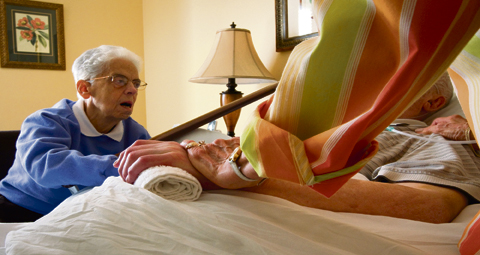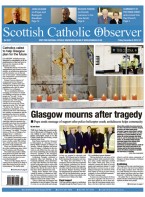November 29 | ![]() 0 COMMENTS
0 COMMENTS ![]() print
print

Strong in faith— DISCUSSION: Assisted suicide is back in the news. Is it really a problem if we help people to kill themselves when they find their quality of life unacceptable?
A weekly discussion chaired by young Catholic students. Have your say at http://www.facebook. com/scostronginfaith
God is the only one who has the right to decide when a life is over.
EOGHAN MAIRTIN
Yes, it’s ridiculous.
ELAINE McLAUGHLIN
What is classed as unacceptable by some may not be by others and therein lies the danger.
Opinions differ, and while the person is alive he or she is not a situation or problem that should be used for political gain. The person should be treated with respect and dignity, and their families helped in whatever difficulties lie ahead.
God should be, for us as Christians, the ultimate ruler of when our life is changed, and when we return home to the Father. For as Christians, life is changed not ended.
CHRISTINE GLEN
Ultimately, assisting people to kill themselves is not compassion. If someone thinks that his/her life is not worth living, it is not compassionate to agree and assist his/her suicide, for in doing so we actually remove one of the only remaining things of value in the person’s life (besides God)—human relationships and the willingness of others to suffer with the person in question.
Seeing a loved one currently approaching the end of life has made this no longer abstract for me—the reality of the suffering of the dying has been brought home to me, but also the fact that it is small acts of human kindness (above) that can make all the difference. It has also brought home to me the darker side—that the temptation to take the easy road would indeed be so very great if society sanctioned assisted suicide or euthanasia.
GERALD BONNER
— Have your say at http://www.facebook.com/scostronginfaith
We must use the gift of life for God’s glory
Margo MacDonald MSP is bringing a new assisted suicide bill before the Scottish Parliament. It would allow people with a terminal or life-shortening illness or condition, and what they consider to be an unacceptable quality of life, to seek help in ending their lives.
It is argued that it is a necessary response to pain and suffering, and a protection of human dignity. In fact, assisted suicide is unnecessary, dangerous, and unethical.
Modern palliative care (right) can control all but the most severe pain. In those few cases where the pain cannot be controlled by ordinary means, therapeutic sedation can be used to decrease awareness or induce unconsciousness.
Even in those areas where assisted suicide is legal, it is not usually physical pain that is cited as the reason for suicide but rather a desire not to be a burden, and a perceived loss of dignity. These both reflect rather badly on society: what does it say about the way we treat the sick and vulnerable if people are afraid or ashamed of being a burden?
Of course there are many aspects of terminal illnesses and progressive conditions that really are horrible and that anyone would wish to avoid. But it is really an indication that we need a new approach to dignity. We often talk of people maintaining their dignity in the most undignified of situations. This is what we should be helping people to do, not helping them to kill themselves.
Assisted suicide would also put the vulnerable at risk. It would be quite possible for someone to, knowingly or not, succumb to the pressures, deliberate or not, of a friend or relative. For example, a mother might end her life for fear of being a financial, emotional or care burden on her children. In this way, a so-called right to die could be seen by some as more of a duty to die.
Most importantly, assisted suicide is wrong. The law currently recognises the inherent dignity of every human life: the dignity that comes from simply being human. As Christians, we recognise that we were created in the image and likeness of God, that we are temples of the Holy Spirit. Our dignity goes far beyond our physical capacities and ultimately comes down to our being rather than our doing.
Life is God’s fundamental gift to us, and a great mystery. To deliberately end a life simply to end that life is ultimately to reject God and His love for us. As the Catechism says: “We are stewards, not owners, of the life God has entrusted to us. It is not ours to dispose of.” (2280)
A final consideration is that we often hear of people being ready to die. As Christians, what we should be asking is whether we are ready for death —not for the act of dying, but for what comes after?
As the season of Advent begins, and we both look forward to the celebration of Christmas and prepare for Christ’s second coming, we do well to remember the great gift of life and to make sure we can give a good account of how we have used it for God’s glory











